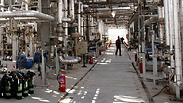
The dispute over the heavy water reactor at Arak, one of the sticking points in nuclear negotiations between Iran and the West, is "virtually resolved," Iran's nuclear chief Ali Akbar Salehi said Saturday.
The Arak reactor, located 240 km southwest of Tehran, could theoretically provide Iran plutonium that could offer an alternative route to produce an atomic bomb. Tehran says the 40-megawatt reactor, whose construction is monitored by the International Atomic Energy Agency (IAEA), is meant for medical research.
"Iran has made a proposal to the P5+1 group to make certain changes in Arak and they have accepted. This question is virtually resolved," Salehi told Al-Alam Arabic-language television.
Iran state television quoted Salehi as saying the proposal Tehran made was to redesign the Arak reactor to produce one-fifth of the plutonium initially planned for it. The report quoted Salehi as saying that will end concerns the West has that Iran could use the plutonium produced at Arak to build a nuclear weapon.
"We are studying changing the fuel cycle from natural to enriched uranium of between four to five percent. The other side has been informed of our plan and they welcomed the idea, as it removes their concern over plutonium output."
Related stories:
- Senior Iranian official: US has been sabotaging our nuclear program
- IAEA: Iran meeting commitments under nuclear deal
- IAEA: Iran halts nuclear capacity expansion under Rohani
The United States has proposed to transform the heavy water reactor to a light water reactor, a proposal Iran has rejected. However, Tehran has proposed to modify the reactor's design in order to limit the plutonium it could produce.
Iran and the so-called P5+1 states - US, France, UK, Russia, China and Germany - are currently engaged in negotiations to reach a final-status agreement to settle the Iranian nuclear dispute.
As part of an interim agreement signed in November, which came into effect on January 20, Iran has agreed to limit construction at the Arak reactor.
The Islamic Republic pledged not to build a reprocessing plant needed to purify the plutonium for military use feared by the world powers and Israel, despite repeated denials by Tehran.
Furthermore, Salehi said Iran had completed watering down and converting more than 200 kilograms (440 lb) of enriched uranium.
"Based on the agreement with the West, we were supposed to have half of our 200 kilogram stock of uranium diluted and the other half converted to uranium oxide," Salehi said.
As part of the interim agreement, Iran must convert half of its 200 kilos of 20 percent enriched uranium to 5 percent and the other half into fuel for its medical reactor in Tehran.
The International Atomic Energy Agency said on Thursday that Iran has acted to cut its most sensitive nuclear stockpile by nearly 75 percent in implementing a landmark pact with world powers, but a planned facility it will need to fulfill the six-month deal has been delayed.
"At the moment, the operations of conversion to uranium oxide (used to produce the fuel) have not started yet," IAEA spokesman Behrouz Kamalvandi told Iranian news agency ISNA.
"Iran will attempt to complete these conversions in the next three months in accordance with the agreement," he added.
According to diplomats based in Vienna where the IAEA headquarters are located, the Islamic Republic is strictly following the application of the agreement.
Salehi, who heads the country's atomic energy organisation, said the fast process of uranium conversion was expected to expedite the release of frozen Iranian assets in the West.
Under the breakthrough agreement, Iran halted some aspects of its nuclear program in exchange for a limited easing of international sanctions that have laid low the major oil producer's economy.
If it complies with the interim deal, Iran will get a total of $4.2 billion in revenues long frozen oversees, in eight instalments over the January-July period. Including Japan's latest payments, it has received $2.55 billion. South Korea, another importer of Iranian oil, has made one payment.
Salehi also said Iran would be ready within a month to answer all six questions raised by the IAEA about Iran's suspected nuclear activities.
"We don't have any more problems with IAEA on the nuclear issue. There are no more questions that we haven't answered. In other words, we can say Iran's nuclear activities is a closed case already," he said.
The Associated Press and Reuters contributed to this report.















